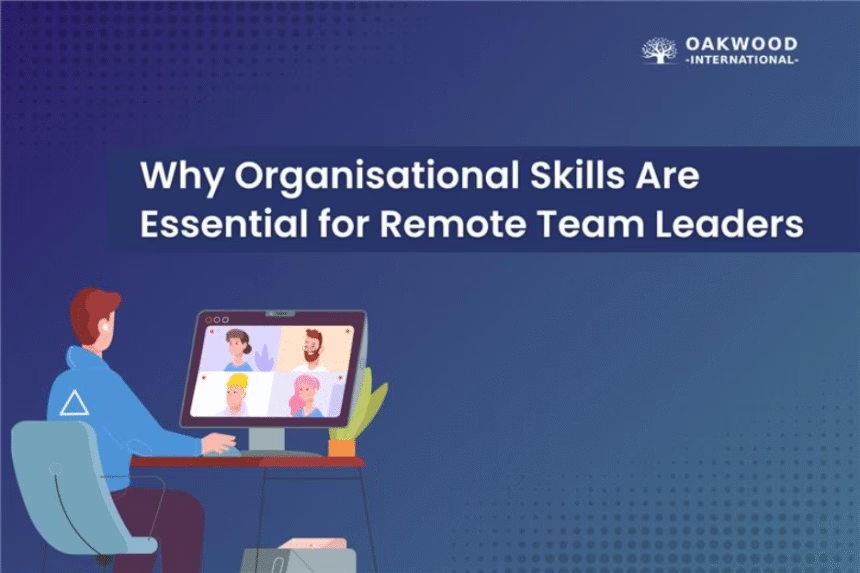Leading a team you cannot see every day brings unique challenges. Tasks get scattered, time zones clash, and communication can feel harder to manage. This is why remote leaders need more than technical knowledge to succeed.
By taking the CIPD Level 5 Associate Diploma in Organisational Learning and Development, leaders gain the tools to build structure in a virtual world. Strong Organisational Skills make the difference between confusion and clarity.
In this article, we will look at why these skills are essential for anyone leading remote teams.
Table of Contents
- Key Reasons Organisational Skills Matter for Remote Leaders
- Conclusion
Key Reasons Organisational Skills Matter for Remote Leaders
Strong organisational skills are the backbone of effective remote leadership, helping teams stay connected and confident. Below are the key reasons why these skills make the biggest impact:
Clear Prioritisation for Complex Tasks
Remote teams manage many moving parts. Work comes from clients, managers, and cross-functional partners. Without clear priorities, queues grow and people stall. Start with a simple list of outcomes for the week.
Rank them by impact and effort. Share the order with the team and explain why it matters. Review midweek to adjust. This rhythm keeps focus on meaningful tasks and reduces noise that slows progress.
Effective Time Management Across Different Zones
Time zones can break momentum if you let them. Map everyone’s core hours and publish a shared schedule. Place stand-ups and reviews where most people can join. Use recorded updates for those who cannot. Set response windows for chat and email so pressure stays healthy. Protect deep work blocks with calendar holds. These habits keep projects moving while respecting personal time and energy.
Strong Communication Flow
Clarity is everything when people are apart. Define where each type of message lives. Use chat for quick updates and a project board for tasks. Keep documents in one shared space with clear names. Run short weekly check-ins to surface blockers early.
End meetings with written actions and owners. When information is easy to find, the team spends less time chasing context and more time delivering results.
Better Resource Allocation
Great leaders place the right person on the right task at the right moment. Start by listing skills across the team. Match tasks to strengths, then add stretch work for growth. Track workload in a simple capacity view so assignments stay fair. Rotate routine tasks to avoid fatigue. Keep a small buffer for urgent requests. Smart allocation reduces waste and helps people feel valued for what they do best.
Reducing Stress and Building Confidence
When a job seems ambiguous or never-ending, stress levels soar. Divide large objectives into little chunks and track your progress. Provide schedules that encompass review time in addition to deadlines.
To boost spirits, celebrate small victories. Provide periods of quiet concentration and basic checklists to help direct everyday tasks. People move more quickly and worry less when they know what good looks like. The team performs with calm focus as confidence grows.
Driving Team Accountability
Accountability grows in a culture of honest tracking. Use a single board with owners, due dates, and status labels. Review it together at set times. Ask what is blocked and what support is needed. Keep notes so decisions are visible to all.
Praise behaviours that help others finish on time. When ownership is clear and progress is public, people follow through and trust rises across the group.
Supporting Long-Term Growth
Short-term delivery matters, but long-term habits shape the team. Create simple playbooks for recurring work so quality stays steady. Run regular retros to capture lessons and improve processes. Pair teammates for knowledge-sharing sessions.
Keep a skills log and plan learning goals for each person. These small systems compound over months. The team becomes faster, more flexible, and ready for bigger challenges.
Building Trust Through Consistency
Trust grows when behaviour is steady and fair. Use consistent meeting formats and clear start and end times. Share notes on the same day so no one waits for decisions. Give feedback quickly and kindly. Hold the same standards for everyone, including yourself.
When people can predict how work runs, they feel safe to speak up and take ownership. Consistency turns distance into dependable teamwork.
Conclusion
Remote team leadership demands clarity and consistency, all of which depend on strong organisational skills. Leaders who master them create confident teams and maintain smooth operations across locations.
To strengthen your ability in this area, consider professional guidance. Oakwood International provides training that can help leaders refine their skills and succeed in today’s remote working environment.
Related News:
SkillJar Helps Develop Microlearning Strategies in Customer Training














